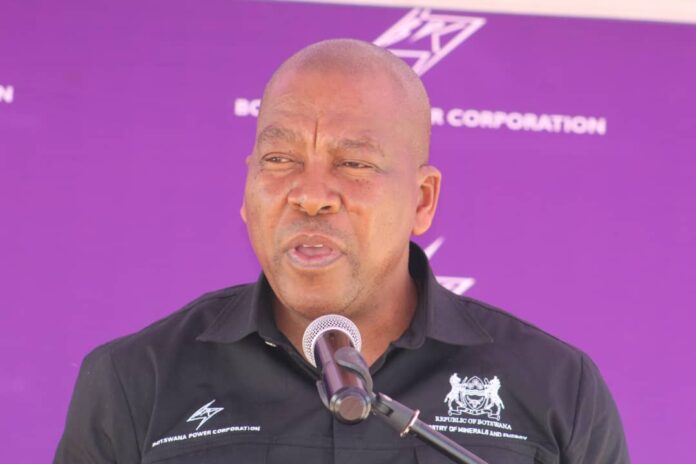28th August 2024
Sello Motseta
Batswana have been encouraged to take advantage of the newly introduced free household electricity connection initiative which does not discriminate against household structures or any type of home, including traditional Setswana houses.
The Government of Botswana has committed to attaining 100% electricity access through residential households by 2030. This commitment is underlined by a commitment to ensuring that such access must be affordable, reliable, and modern for all.
The Government of Botswana introduced free electricity connections to all households on 1st April 2024, to increase energy access and help Batswana transform their living standards.
This decision resulted from a review of the National Electricity Standard Connection Cost (NESC), which recognized that the standard costs of P5, 000 and P2, 500 were not sufficient to ensure universal access of 100% target. The current electricity access rate stands at 72%, and zero connection costs offers a more realistic opportunity to attain universal access.
Lefoko Moagi, Minister of Minerals and Energy, said “It is with immense pleasure and great honour that I stand before you today as we launch the 2024/25 Rural Electrification Project. This momentous occasion marks history for Khwee Village and many other villages which will be connected to the national grid. This project represents a vital component of our collective effort to transform Botswana into a high-income country, in alignment without Vision 2036 goals.”
He said, “Our National Vision is clear, we aim to elevate Botswana from an upper-middle-income country to a high-income nation by achieving an annual GDP growth rate of 6% by 2036. This target is not merely a number; it reflects our unwavering commitment to fostering sustainable economic development and enhancing the quality of life for all Batswana.”
The 2024/25 Village Electrification Project, encompasses the electrification of twenty (20) new villages and the extension of networks in ninety-two (92) villages across the country.
The total estimated cost for electrifying these twenty new villages is P209,275,950.96, while the cost for extending the network to the ninety-two villages amounts to P286, 241,230.90. This ambitious project will span the current financial year 2024/25 and continue into 2025/26.
This project will provide the much-needed infrastructure to support critical sectors and drive economic growth in Khwee Village and 19 other villages, namely; Kuke, Qabo, Mogobewakgomo, Inalegolo, Ditshukudu, Losilakgokong, Maratswaane, Gamononyane, Tshwaane, Kaudwane, Mahotshwane, Thankane, Kanuku, Somelo, Gani, Tobera, Tsodilo, Chukumuchu, and Dipotsana.
Entrepreneurs will have the resources they need to start and expand their ventures, fostering economic development and creating jobs within their communities. This project will enable businesses to operate more efficiently and open new avenues for economic activity.
According to officials, the journey towards countrywide electrification began in 1975, when Botswana was in the early stages of development. Back then, most electrification projects were funded through financial assistance from international agencies. The Botswana Power Corporation (BPC) was tasked with the responsibility of electrifying government institutions in major villages using diesel generators.
The reach of these projects was limited, and electricity access was restricted to a select few.
The availability of electricity facilitates the establishment of new businesses, drives economic growth, and enhances the quality of life in these communities. The Government, as the custodian of rural electrification, provides significant financial support to BPC to implement these projects.
The Rural Electrification Programme was established to address the critical need for electricity in rural areas. Since its inception, this program has been a cornerstone of government efforts to uplift the living standards of the rural populace and stimulate business growth.
This include the 2023/24 Village Electrification Project which was launched in August 2023 in Lepashe village and the project consisted of six(6) new villages and twenty-seven (27) network extensions. This achievement underscores our commitment to ensuring that no part of Botswana is left in the dark.
“Once this project is completed, the rural village electrification rate will increase from 82.5% to 86%, a commendable milestone compared to other countries in the region,” said Moagi.
However, as villages grow and new plots are developed, the need for continued network extension becomes increasingly evident.
“As lands, farms, and settlements are upgraded to villages and as new plots are allocated in established villages, we must extend our network to accommodate these changes. Consequently, a significant portion of our budget is dedicated annually to network extensions, ensuring that newly awarded plots and growing communities are integrated into the electricity network,” said Moagi.
He said, “By extending the electricity network to every gazetted village, we are not just bringing light into homes but also illuminating the path to economic development and an improved quality of life. Today, as we embark on this journey, we are not only bringing electricity to homes and businesses but also igniting hope and possibilities.”
Access to electricity is not merely a convenience; it is a catalyst for development. It enables businesses to flourish, supports educational advancement, enhances healthcare services, and generally improves the quality of life.
David Kgoboko, Chief Executive Officer(CEO) of Botswana Power Corporation(BPC), said “In 565 villages around the country we have been able to connect 462 villages to electricity.”









